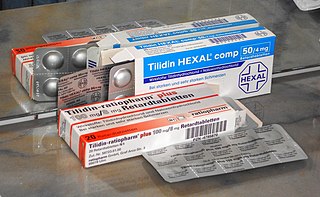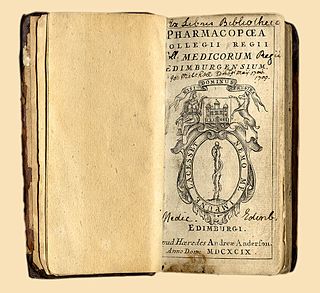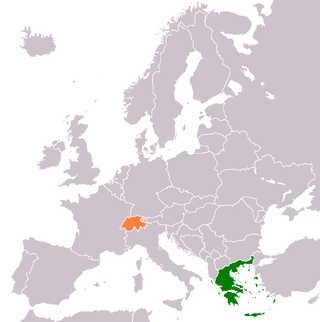
Pharmacology is a branch of medicine, biology, and pharmaceutical sciences concerned with drug or medication action, where a drug may be defined as any artificial, natural, or endogenous molecule which exerts a biochemical or physiological effect on the cell, tissue, organ, or organism. It is the science of drugs including their origin, composition, pharmacokinetics, therapeutic use, and toxicology. More specifically, it is the study of the interactions that occur between a living organism and chemicals that affect normal or abnormal biochemical function. If substances have medicinal properties, they are considered pharmaceuticals.

Novartis AG is a Swiss multinational pharmaceutical corporation based in Basel, Switzerland. Consistently ranked in the global top five, Novartis is one of the largest pharmaceutical companies in the world and was the fourth largest by revenue in 2022.

A medication is a drug used to diagnose, cure, treat, or prevent disease. Drug therapy (pharmacotherapy) is an important part of the medical field and relies on the science of pharmacology for continual advancement and on pharmacy for appropriate management.

Pharmacy is the science and practice of discovering, producing, preparing, dispensing, reviewing and monitoring medications, aiming to ensure the safe, effective, and affordable use of medicines. It is a miscellaneous science as it links health sciences with pharmaceutical sciences and natural sciences. The professional practice is becoming more clinically oriented as most of the drugs are now manufactured by pharmaceutical industries. Based on the setting, pharmacy practice is either classified as community or institutional pharmacy. Providing direct patient care in the community of institutional pharmacies is considered clinical pharmacy.

A pharmacopoeia, pharmacopeia, or pharmacopoea, in its modern technical sense, is a book containing directions for the identification of compound medicines, and published by the authority of a government or a medical or pharmaceutical society.
An active ingredient is any ingredient that provides biologically active or other direct effect in the diagnosis, cure, mitigation, treatment, or prevention of disease or to affect the structure or any function of the body of humans or animals.
Farmakonisi or Pharmakonisi is a small Greek island and community of the Dodecanese, in the Aegean Sea, Greece. It lies in the middle between the chain of the Dodecanese islands in the west, and the coast of Asia Minor (Turkey) in the east. To the north of it are the island of Agathonisi, to the west the islands of Leipsoi, Patmos and Leros, and to the south the islands of Kalymnos and Pserimos. It forms part of the municipality of Leros, and had a 2001 census population of 74 inhabitants, while in the 2011 census the population dropped to 10 inhabitants. Prominent historical monuments on the island include the church of Agios Georgios and the nearby ruins of an ancient Roman temple.

A vial is a small glass or plastic vessel or bottle, often used to store medication in the form of liquids, powders, or capsules. They can also be used as scientific sample vessels; for instance, in autosampler devices in analytical chromatography. Vial-like glass containers date back to classical antiquity; modern vials are often made of plastics such as polypropylene. There are different types of vials such as a single dose vial and multi-dose vials often used for medications. The single dose vial is only used once whereas a multi-dose vial can be used more than once. The CDC sets specific guidelines on multi-dose vials.
Taxation in Greece is based on the direct and indirect systems. The total tax revenue in 2017 was €47.56 billion from which €20.62 billion came from direct taxes and €26.94 billion from indirect taxes. The total tax revenue represented 39.4% of GDP in 2017. Taxes in Greece are collected by the Independent Authority for Public Revenue.
In Denmark, pharmaconomists are experts in pharmaceuticals who have trained with a 3-year tertiary degree. Pharmaconomy describes either their professional practice or their training courses.
Micromeritics is the science and technology of small particles pioneered by Joseph M. DallaValle. It is thus the study of the fundamental and derived properties of individual as well as a collection of particles. The knowledge and control of the size of particles has importance in pharmacy and materials science. The size, and hence the surface area of a particle, can be related to the physical, chemical and pharmacological properties of drugs. Clinically, the particle size of a drug can affect its release from dosage forms that are administered orally, parenterally, rectally and topically. The successful formulation of suspensions, emulsions and tablets; both physical stability and pharmacological response also depends on the particle size achieved in the product.

Greek-Swiss relations are foreign relations between Greece and Switzerland. Both countries established diplomatic relations in 1830. Switzerland opened its consulate in 1865. Greece has an embassy in Bern, a general consulate in Geneva, and two honorary consulates in Zürich and Lugano. Switzerland has an embassy in Athens and four consulates.

Canada and Greece first exchanged ambassadors in 1942. Both countries are members of the Organisation for Economic Co-operation and Development, Organisation internationale de la Francophonie, Organization for Security and Co-operation in Europe, NATO and the United Nations. There is a strong Greek community living in Canada.

The history of pharmacy as a modern and independent science dates back to the first third of the 19th century. Before then, pharmacy evolved from antiquity as part of medicine. The history of pharmacy coincides well with the history of medicine, but it's important that there is a distinction between the two topics. Pharmaceuticals is one of the most-researched fields in the academic industry, but the history surrounding that particular topic is sparse compared to the impact its made world-wide. Before the advent of pharmacists, there existed apothecaries that worked alongside priests and physicians in regard to patient care.

Healthcare in Greece consists of a universal health care system provided through national health insurance, and private health care. According to the 2011 budget, the Greek healthcare system was allocated 6.1 billion euro, or 2.8% of GDP. In a 2000 report by the World Health Organization, the Greek healthcare system was ranked 14th worldwide in the overall assessment, above other countries such as Germany (25) and the United Kingdom (18), while ranking 11th at level of service.
Dimitrios Pavlos Giannakopoulos is a Greek businessman and pharmaceutical manufacturer. He is the President of the Board and CEO of VIANEX, owner of Panathinaikos B.C. as well as owner of the 50% of the company SUPERFOODS SA, among many other activities.

Vianex S.A. is a Greek pharmaceutical company, founded in 1971 by the Giannakopoulos’ family that has been involved with the pharmaceutical industry since 1924.
Rho Chi (ΡΧ) is an international honor society for pharmaceutical sciences. It was founded on May 19, 1922, to "encourage high scholastic achievement and fellowship among students in pharmacy and to promote the pharmaceutical sciences".
Cannabis in Greece is illegal for recreational purposes. In 2017, the Greek government legalized the use of cannabis for medical purposes, and a year later, they lifted the ban on growing or producing it. This enables pharmaceutical companies to grow cannabis legally, and industrial hemp suppliers too.

Albert Bourla is a Greek-American veterinarian and the chairman and chief executive officer of Pfizer, an American pharmaceutical company. He joined the company in 1993 and has held several executive roles across Pfizer's divisions. Prior to becoming chief executive officer, Bourla served as chief operating officer.













